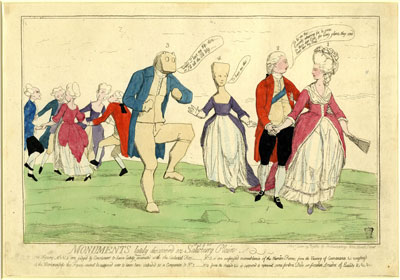Monuments Lately Discovered on Salisbury Plain
As the British Museum commentary suggests, this print is a "satire on the attentions of the Prince of Wales to Lady Salisbury.", the Prince identified by the star emblem upon his chest and Lady Salisbury by implication from the print title. But since it is the two stone figures (monuments) who are visually central in the print,it may be more accurate to note that the satire includes the implications and effects of the Prince's attentions on an angry husband, Lord Salisbury, and an abandoned lover, Perdita Robinson—well known at the time as the young Prince's first mistress.

© Trustees of the British Museum
The print is also a good example of the transitional state of Gillray's graphic satire early in his career. He does not yet include caricature portraits of any of the main figures. You would never know, for instance, that this is the same Lady Salibury who appears later in Gillray's work in Diana Return'd from the Chace. Their faces convey little more than the stone faces of their jilted companions. And as in older emblematic satire, much of the information about the meaning of the print is conveyed by the title and a numbered "Key" which serves as a caption to the image.
The Figures No. 1 & 2 are Judged by Conoiseurs (sic) to have lately been animated with the Celestial Fire - No. 3 is an unfinish'd resemblance of the Human Form, from the Vacancy of Countenance & roughness of the Workmanship this Figure cannot be supposed ever to have been intended as a companion to No. 1. No. 4 from the Attitude &c is supposed to represent some forlorn Dido or forsaken Ariadne of Quality &c. &c. &c.
And yet, in spite of the emblematic key, there is some visual drama and expression in the body language of the figures—the anger suggested by the clenched fists and stamping foot of Lord Salisbury; the surprise and dismay revealed in the attitude of Perdita Robinson; the sense of exclusion indicated by the Prince and Lady Salisbury gazing only at one another. And it may not be accidental that the hands of two lovers are joined in front of the Prince's crotch.
But, as he was wont to do throughout his career, Gillray provides additional frames through which to view the print by allusions to other works of literature and mythology. The words spoken by Mrs. Robinson, for instance, are the refrain of a poem by Sir Thomas Wyatt which includes lines like these:
And wilt thou leave me thus,
That hath loved thee so long
In wealth and woe among?
And is thy heart so strong
As for to leave me thus?
Say nay, say nay!
And wilt thou leave me thus,
That hath given thee my heart
Never for to depart,
Nother for pain nor smart;
And wilt thou leave me thus?
Say nay, say nay!
And in the caption, Perdita is identfied with Dido (famously abandoned by Aeneas) in Vergil's Aeneid and Ariadne (similarly betrayed by Theseus) in a poem by Catullus. So she is seen in a tradition of tragic heroines, abused by the men they supported
But perhaps most damning for the Prince, his words to Lady Salisbury are quoted nearly verbatim from a play by Thomas Otwway, The Orphan: or, The Unhappy Marriage at the end of Act 1 in which Polydore, the villain of the piece, tries to seduce the orphaned and innocent Monimia, adopted by his father.
Polydore
Oh! I could talk to thee for ever; Thus
Eternally admiring, fix and gaze
On those dear Eyes, for every glance they send
Darts through my Soul, and almost gives enjoyment.
Monimia.
How can you labour thus for my undoing?
I must confess, indeed, I owe you more,
Than ever I can hope to think to pay.
There alwayes was a Friendship 'twixt our Families;
And therefore when my tender Parents dy'd,
Whose ruin'd Fortunes too expir'd with them,
Your Fathers pity and his Bounty took me
A poor and helpless Orphan to his care.
Polydore
'Twas Heav'n ordain'd it so to make me happy.
Hence with this peevish Vertue, 'tis a cheat,
And those who caught it first, were Hypocrites;
Come, these soft tender Limbs were made for yielding.
In the play Monimia is tricked into sleeping with Polydore and kills herself for shame. But in real life Lady Salisbury (12 years older than the Prince) seems to have been canny enough to keep her distance. She is not typically listed among his many mistresses.
Sources and Reading
- Commentary from the British Museum on Monuments Lately Discovered on Salisbury Plain.
- Draper Hill, Mr. Gillray The Caricaturist, 1965, p. 118.
- Draper Hill, Fashionable Contrasts, 1966, #51.
- "The Orphan (play)," Wikipedia
- The Orphan: or, The Unhappy Marriage. A Tragedy in Five Acts
- "James Cecil, 1st Marquess of Salisbury," Wikipedia
- "Emily Cecil, Marchioness of Salisbury," Wikipedia
- "George IV" Wikipedia
- Thomas Wright and R.H. Evans, Historical and Descriptive Account of the Caricatures of James Gillray #XXX.
- Thomas Wright and Joseph Grego, The Works of James Gillray, the Caricaturist; With the History of His Life and Times, p. X.
Comments & Corrections
NOTE: Comments and/or corrections are always appreciated. To make that easier, I have included a form below that you can use. I promise never to share any of the info provided without your express permission.